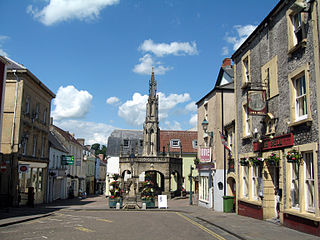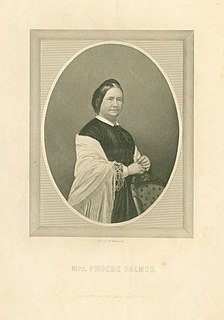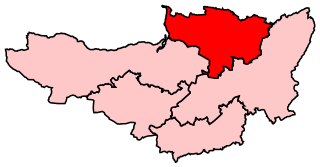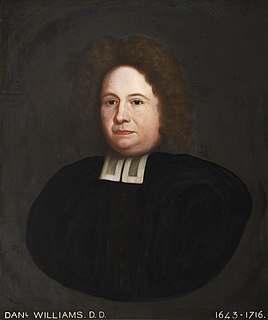Related Research Articles

Jonathan Edwards was an American revivalist preacher, philosopher, and Congregationalist Protestant theologian. Edwards is widely regarded as one of America's most important and original philosophical theologians. Edwards' theological work is broad in scope, but he was rooted in Reformed Anglican theology, the metaphysics of theological determinism, and the Puritan heritage. Recent studies have emphasized how thoroughly Edwards grounded his life's work on conceptions of beauty, harmony, and ethical fittingness, and how central The Enlightenment was to his mindset. Edwards played a critical role in shaping the First Great Awakening, and oversaw some of the first revivals in 1733–35 at his church in Northampton, Massachusetts. His theological work gave rise to a distinct school of theology known as the New England theology.

Shepton Mallet is an English town and civil parish in the Mendip District of Somerset, about 16 miles (26 km) south-west of Bath, 18 miles (29 km) south of Bristol and 5 miles (8.0 km) east of Wells, with an estimated population of 10,369 in 2014. Mendip District Council is based there. The Mendip Hills lie to the north and the River Sheppey runs through the town, as does the route of the Fosse Way, the main Roman road into south-west England. There is evidence of Roman settlement. Its medieval parish church is among many listed buildings. Shepton Mallet Prison was England's oldest until it closed in March 2013. The medieval wool trade gave way to industries such as brewing in the 18th century. The town remains noted for cider production. Shepton Mallet is the closest town to the Glastonbury Festival. Also nearby is the Royal Bath and West of England Society showground.

Arthur Penrhyn Stanley,, known as Dean Stanley, was an English Anglican priest and ecclesiastical historian. He was Dean of Westminster from 1864 to 1881. His position was that of a Broad Churchman and he was the author of a number of works on Church History. He was a co-founder of the Palestine Exploration Fund.

John Allsebrook Simon, 1st Viscount Simon,, was a British politician who held senior Cabinet posts from the beginning of the First World War to the end of the Second World War. He is one of only three people to have served as Home Secretary, Foreign Secretary and Chancellor of the Exchequer, the others being Rab Butler and James Callaghan.

A Methodist local preacher is a layperson or deacon who has been accredited by the Methodist church to lead worship and preach on a regular basis. These preachers have played an important role in Methodism since the earliest days of the movement, and have also been important in English social history. With separation from the Church of England by the end of the 18th century, a clear distinction was recognised between ordained Methodist ministers (presbyters) and the local preachers who assisted them. Local preachers continue to serve an indispensable role in the Methodist Church of Great Britain, in which the majority of church services are led by laypeople.

Batcombe is a village and civil parish in the Mendip district of Somerset, England, situated in the steep valley of the River Alham 5 miles (8 km) south-east of Shepton Mallet and 26 miles (42 km) south of Bristol. The parish has a population of 439. Batcombe village is at the heart of the parish, which also includes the hamlets of Westcombe, Spargrove and Eastcombe.

Phoebe Palmer was a Methodist evangelist and writer who promoted the doctrine of Christian perfection. She is considered one of the founders of the Holiness movement within Methodist Christianity.

Thomas Goodwin, known as "the Elder", was an English Puritan theologian and preacher, and an important leader of religious Independents. He served as chaplain to Oliver Cromwell, and was imposed by Parliament as President of Magdalen College, Oxford, in 1650. Christopher Hill places Goodwin in the "main stream of Puritan thought".

Wells is a constituency represented in the House of Commons of the UK Parliament since 2015 by James Heappey of the Conservative Party.

Ashwick is a village in the Mendip district of Somerset, England, about three miles north of Shepton Mallet and seven miles east from Wells. It has also been a civil parish since 1826. The parish had a population of 1,352 according to the 2011 census, and apart from Ashwick village also includes Gurney Slade and Oakhill.

HMP Shepton Mallet, sometimes known as Cornhill, is a former prison located in Shepton Mallet, Somerset, England. When it closed in 2013, it was the United Kingdom's oldest operating prison, and had been since the closure of HMP Lancaster Castle in 2011. Before closure Shepton Mallet was a category C lifer prison holding 189 prisoners. The prison building is grade II* listed, while the former gatehouse and perimeter walls are grade II.
James Foster was an English Baptist minister.
Reverend Thomas Rosewell was a Nonconformist minister of Rotherhithe, Surrey who was found guilty of treason but subsequently pardoned by King Charles II.

Daniel Williams was a British benefactor, minister and theologian, within the Presbyterian tradition, i.e. a Christian outside the Church of England. He is known largely for the legacy he left which led to the creation of Dr Williams's Library, a centre for research on English Dissenters.

Oliver Heywood (1630–1702) was a British nonconformist minister, ejected for his beliefs.
Henry Albin was an English minister, ejected for nonconformity.

The Rev. Samuel Eyles Pierce was an English preacher, theologian, and Calvinist divine. A Dissenter from the Honiton area, Pierce was an evangelical church minister aligned with Calvinist Baptist theology. He wrote more than fifty books and many sermons.
Thomas Dixon was an English nonconformist minister and tutor.

Jeremiah White (1629–1707), was a 17th-century Nonconformist minister, preacher to the Council of State, and Puritan chaplain to Oliver Cromwell.
The Hundred of Whitstone is one of the 40 historical Hundreds in the ceremonial county of Somerset, England, dating from before the Norman conquest during the Anglo-Saxon era although exact dates are unknown. Each hundred had a 'fyrd', which acted as the local defence force and a court which was responsible for the maintenance of the frankpledge system. They also formed a unit for the collection of taxes. The role of the hundred court was described in the Dooms (laws) of King Edgar. The name of the hundred was normally that of its meeting-place.
References
- Trapnell, William H. "Browne, Simon". Oxford Dictionary of National Biography (online ed.). Oxford University Press. doi:10.1093/ref:odnb/3698.(Subscription or UK public library membership required.)